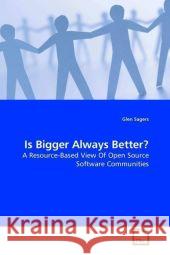Is Bigger Always Better? : A Resource-Based View Of Open Source Software Communities » książka
Is Bigger Always Better? : A Resource-Based View Of Open Source Software Communities
ISBN-13: 9783639199000 / Angielski / Miękka / 2009 / 108 str.
Much research has been conducted about how Open Source Software (OSS) is produced and the motivations of individual volunteers. Two aspects of OSS that remain unexplored are how an OSS project community is sustained, and whether this community is necessary for software success. OSS is a public good; non-rival and non-excludable; and subject neither to underproduction nor overutilization. In OSS, is a community is needed to produce the software, and if so, how is that community sustained? A model of community success using member resources which are converted into community benefits through communication is utilized to answer these questions. A community must maintain access to a pool of resources such as the time, energy, knowledge and material contributions of its members. These resources are converted into community benefits through communication. The benefits are a better software product and a more successful community. The results of this research can help OSS projects to realize the value of feedback from users, and also suggest that other non-OSS communities can benefit from listening to active users in their communities. These users can be a valuable source of innovation.











